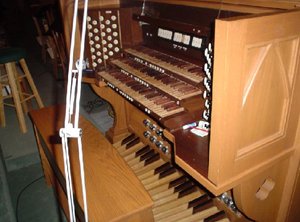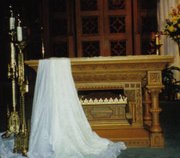St. Raphael's Cathedral (Dubuque)
|
|
StrCathDub.jpg
Saint Raphael's is the Cathedral parish for the Archdiocese of Dubuque. The parish is the oldest church of any Christian denomination in the state of Iowa.
| Contents |
History
The first years
The Cathedral parish traces its origin to 1833, when the first group of settlers gathered for mass. Father Charles Felix Van Quickenborne organized them into a parish. The parish did not have a regular church building yet, the members met at various homes for mass. Father Quickenborn began planning for a church building, but left before the materials were assembled.
Father Charles Francis Fitzmaurice arrived in the area in 1834 and began working with the parish. He gathered materials and money to build the church, but he died during a cholera outbreak in the spring of 1835. He did not have a chance to begin work on the church building. For a time, the parishioners met in a log cabin that was set aside for worship.
The next pastor, Father Samuel Charles Mazzuchelli came to Dubuque later in 1835. He reorganized the parish, and dedicated it to the Archangel Saint Raphael. Under his guidance, a church building was constructed. However, it was built of stone, not wood. Father Mazzuchelli personally drew the plans for this building. This building served for the next 25 years. This old church building was just south of the location of the current building.
In 1837, the Pope created the Dubuque Diocese. In 1839 Bishop Mathias Loras - the first Bishop of Dubuque - arrived. St. Raphael's became the Cathedral parish for the diocese.
BishopLorasOct2004.jpg
Growth and expansion
The next 20 years were ones of growth and expansion for the parish, and of the church in general in Iowa. Bishop Loras encouraged both Irish and German immigrants to come to Iowa from the crowded conditions back east. As a result, the cathedral parish began to grow in size.
By 1845, the Cathedral was usually quite crowded on Sundays. Initially, Bishop Loras was going to build a second parish near what today is known as Washington Park in Dubuque. But even though a cornerstone was laid, work never proceeded past building the foundation.
In 1849, there was a number of German families in the Cathedral parish. Because of the crowded conditions, and because of the challenges of ministering to the Germans, Bishop Loras granted permission for the Germans to form their own parish in Dubuque, which eventually became known as Saint Mary's. Then in 1853, St. Patrick's parish was built 12 blocks north to serve as a second parish for Irish families.
After St. Patrick's was founded, Bishop Loras soon came to realize that the founding of those additional parishes would only be a temporary solution. He realized that the cathedral parish needed a larger building. Bishop Loras once again began planning for the new Cathedral.
The present building
In 1857, construction began on land just north of the old Cathedral building. On July 5, 1857, a large crowd watched as the cornerstone was laid. The Cathedral was based on Magdalen College in Oxford, England. The architect was John Mullany, a local architect who designed New Melleray Abbey, and Saint Mary's Church. This new church was over three times the size of its predecessor.
Despite his failing health, construction had advanced far enough that Bishop Loras was able to offer his first mass in the new Cathedral on Christmas Day, 1857. Two months later, Bishop Loras died.
The Cathedral was completed in 1861. The formal blessing and dedication of the present building was done by Bishop Clement Smyth on July 7, 1861. Father Samuel Mazzuchelli assisted with the dedication.
The Cathedral's tower and spire were finally finished in November 1876. A number of renovations were also made in the 1880s. These included placing new vaulting in the cathedral which were made of iron, and lowering the capitals down by four feet. The stained glass windows in the church which had been imported from London were installed in 1889. Another large addition was made behind the sanctuary - this addition served for nearly a century as the Blessed Sacrament Chapel.
In 1902, a mortuary chapel was built in the lower level of the cathedral. Contained within this chapel are vaults buried underneath the floor in front of the altar. These vaults contain the bodies of the former Bishops of Dubuque; Bishop Loras, Bishop Clement Smyth, Archbishop John Hennessey, Archbishop Francis Beckman, and Archbishop James Byrne. Also buried in the chapel is Archbishop Raymond Ettledorf - a local Priest who eventually became a Nuncio to New Zealand and parts of Africa.
Two more renovations were done in the first part of the 20th century. The first was done in 1914, and the second in 1936.
A new expanded main entrance was eventually built. The addition contained new staircases which replaced the old outdoor stairs that originally led to the side entrances, which were now also indoors. Three new sets of doors were placed at street level. Also an elevator was added to make the building more handicapped accessible.
The 1986 renovations
In 1986, the most extensive renovation in years was done to the church. At the time, it had been more than 50 years since the renovation. Also, the parish wanted to make some updates to the design to bring it in line with the philosophy of the Second Vatican Council.
However the proposed renovations were controversial. Some members of the parish felt that the update would destroy the cultural and historical significance of the church.
Work began in the late summer and fall of 1986. The Euchastric Chapel was remodeled into a gathering space for the parish and renamed the Cathedral Center. A new Euchastric Chapel was created by placing a wooden screen between the original high altar, and the new altar. Portions of the original communion rail were used in construction. The original altar was left intact because of its historical significance, and a new tabernacle was placed on the altar.
Because they were a fire hazard, dividers between the pews were removed. The layers of varnish applied over the years to the woodwork were removed, and finished to allow the light oak to show. The walls were painted a lighter color, and a new indirect lighting system was installed. A light green carpet was added - the same color was used throughout the building. Part of the pieta altar was refurbished and installed in the sanctuary as the new main altar, replacing the early 1970s altar.
The sanctuary was extended so that more of the activities associated with the mass took place closer to the congregation. The Archbishop's throne was replaced with a smaller, movable, less elaborate chair that allows him to directly face the congregation during mass.
By November of 1986, the renovations were complete. The remains of the martyr Saint Cessianus were installed in the main altar during the first mass held in the renovated Cathedral on November 23, 1986. This is in respect to the fact that during the early years of the church that Mass was often celebrated over the tombs of Saints and Martyrs.
The lancent window
Strdublancentwin.jpg
Above the main entrance is a large lancent window. This window was part of the original plan for the building. Even though the design of the cathedral was changed several times, the window was left as originally designed in each plan, and as a result, it was built exactly as originally planned.
Only the upper part of the window is visible inside the church, above and behind the organ. The lower part is hidden behind the organ.
The organ
The Cathedral's pipe organ has 46 ranks, with three manuals. The organ is composed of a number of chambers in what was the choir loft, plus another chamber along the southern wall near the front of the church. There is also a set of chimes attached to the organ.
Like a number of other organs, the pipe work is largely left out in the open rather than being contained with the case. The pipe work was artistically arranged to make a stunning visual display.
The organ console is situated in the choir area on the main level near the front of the church. The console can be moved for various activities, such as Mass and recitals.
In 1991, the organ was refurbished after several years of fundraising. The organ is one of the larger ones in the city, and is considered one of the finest in the city.

External link
- The Cathedral Web Site (http://www.raphaelcathedral.4Lpi.com)

